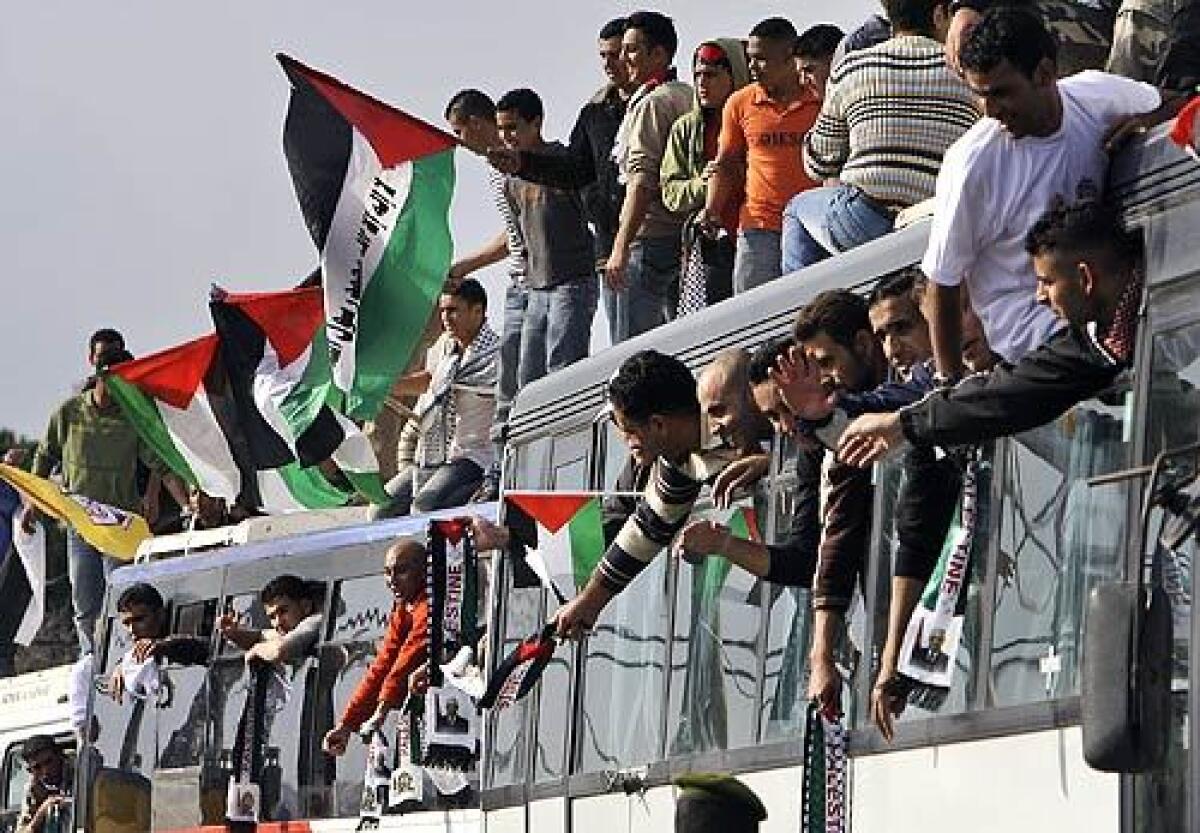Palestinians rejoice as Israel frees 224 prisoners

FOR THE RECORD:
An earlier version of this caption, using information later corrected by the Associated Press, read as follows: “Israel sent home 224 Palestinian prisoners Monday, including these men seen crossing into the Gaza Strip.” The photo was erroneously credited to Hatem Moussa.
- Share via
Reporting from Ramallah, West Bank, and Jerusalem — Israel freed 224 Palestinian prisoners Monday, causing jubilant homecoming celebrations among their families and giving Palestinian Authority President Mahmoud Abbas one of his few achievements from a year of peace talks.
On the same day, Israel expelled a United Nations human rights envoy, Richard Falk, who had been detained upon arrival at the international airport and accused of bias for his criticism of the Jewish state’s treatment of Palestinians.
More than 8,000 Palestinians are held in Israeli prisons, accused of violent and nonviolent resistance to Israeli occupation. Their fate, which absorbs nearly every Palestinian family, is an ongoing issue in U.S.-brokered talks on creating an independent Palestinian state.
The talks have failed to resolve the bigger issues of borders, the fate of Palestinian refugees and rival claims to Jerusalem. But Israel has freed more than 1,000 prisoners in several batches over the last year, a periodic ritual meant to shore up Abbas’ standing among Palestinians and keep the negotiations alive.
The five busloads of prisoners sent home Monday included eight young men from Beit Ur, a village northwest of Ramallah in the West Bank. Dozens of their relatives joined a crowd of hundreds who stood at a yellow gate separating Israel and the West Bank to wave flags, cheer, dance and weep as the buses rolled through en route to a ceremony outside Abbas’ office in Ramallah.
“The village is going to have a big celebration,” said Misbah Suleiman, 53, a former prisoner from Beit Ur whose 26-year-old son, Saber, was coming home.
As she waited at the crossing, Saber’s mother, Jamieh, 50, recalled the night four years ago when Israeli soldiers “took my son from our house and left the place a wreck.” The young man was sentenced to six years in prison for throwing rocks and firebombs at soldiers during the Palestinian uprising that raged during the early part of this decade.
Abbas greeted the freed prisoners individually with kisses on the cheeks after they had descended from the buses and paid tribute at the tomb of his predecessor, Yasser Arafat.
“We are happy deep inside our hearts,” he told them. “But our happiness will not be complete until . . . the suffering of all prisoners ends.”
In the joyous reunions that followed, Mohammed Kadura, 30, hoisted his 2 1/2 -year-old twin boys, who were 4 months old when he was arrested while serving in the militant Al Aqsa Martyrs Brigade, which led the uprising.
Abdel Nasser Hussein, 28, who was arrested at dawn on the day he was to have married 30 months ago, embraced his fiancee, Alaa Issa, as friends and family sang and clapped. They plan to marry in two weeks.
Most of those released Monday are members of Abbas’ West Bank-based Fatah movement. Israeli officials said none were from Hamas, the rival group that controls the Gaza Strip and which Israel, the United States and Fatah are trying to weaken. Hamas has held an Israeli soldier since 2006, seeking to swap him for hundreds of its jailed members.
Many Palestinians say Israel’s periodic prisoner releases have been too small to boost Abbas’ authority, especially because they are partly offset by Israeli arrests of suspected militants in the West Bank.
Falk’s expulsion thwarted his plan to travel to the West Bank and Gaza to document human rights conditions. Landing at Ben Gurion International Airport near Tel Aviv on Sunday, he was taken into custody by border police, held overnight and put on a flight back to Geneva.
Israeli officials were angered by Falk’s remarks last week advocating U.N. pressure on Israel to lift its blockade of the Gaza Strip, which he called “a crime against humanity” comparable to the Nazi persecution of Jews in Europe.
Israeli Foreign Ministry spokesman Yigal Palmor said Falk was denied entry because his mandate from the U.N. Human Rights Council, which allows him to report only on Israeli violations, is “profoundly distorted and conceived as an anti-Israel initiative.”
The council has held several sessions to condemn Israeli action but generally has refrained from criticizing Muslim and African countries.
In New York, U.N. spokeswoman Michele Montas said Secretary-General Ban Ki-moon “regrets that Mr. Falk was denied entry and urges the Israeli authorities to fully cooperate with the special procedures of the Human Rights Council.”
Boudreaux is a Times staff writer and Abukhater is a special correspondent.
More to Read
Sign up for Essential California
The most important California stories and recommendations in your inbox every morning.
You may occasionally receive promotional content from the Los Angeles Times.










